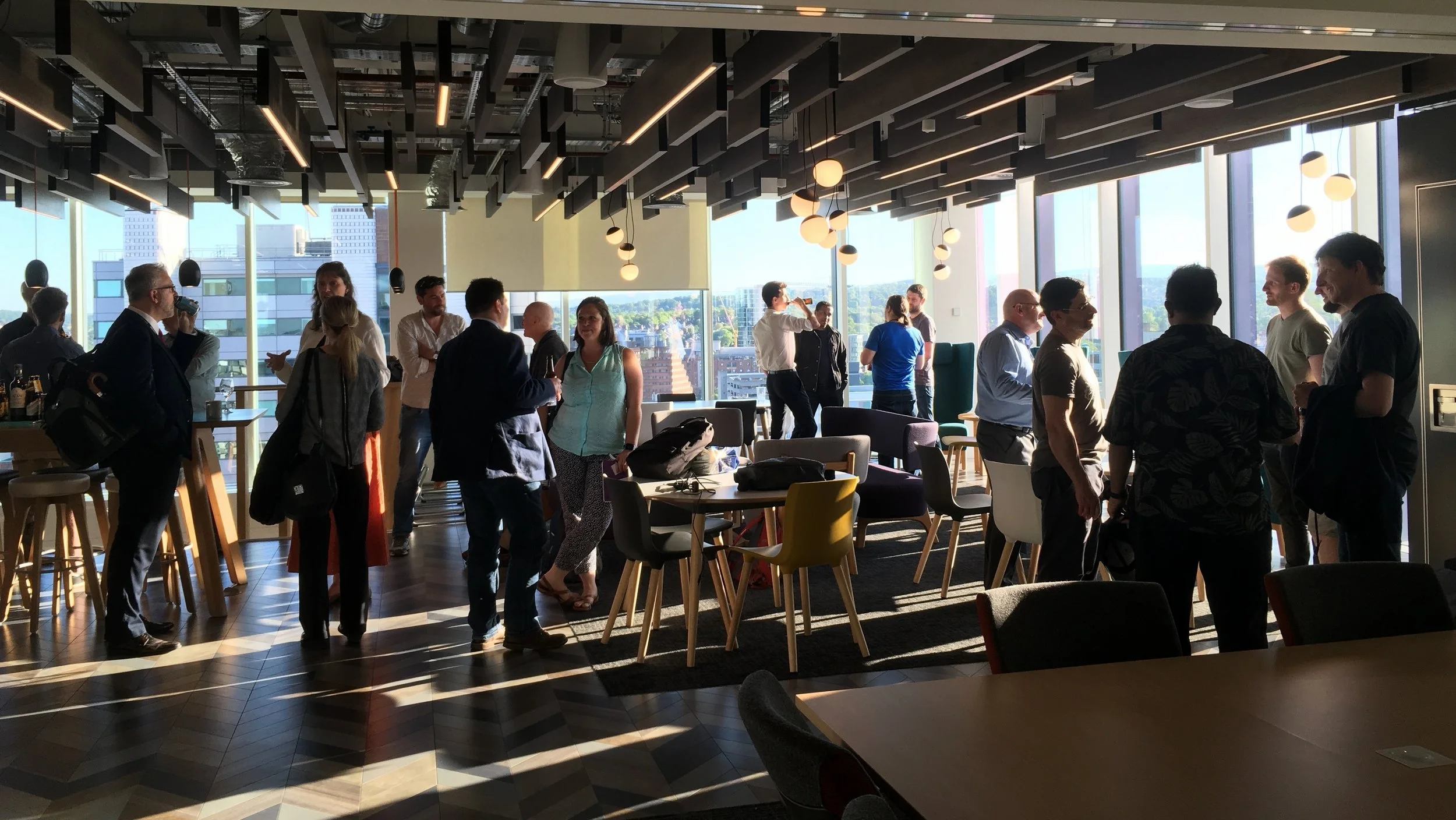Notes from Meetup #10: Connecting with Citizens
The May Meetup took place on Monday the 14th May, on an absolutely gorgeous Summer evening, and was titled “Connecting with Citizens” to reflect the theme of citizen engagement in smart cities activities. This is an area that really should be at the core of the agenda, and given the wealth of tools available and the design creativity that we can draw on in Sheffield there shouldn’t be any excuse for it not to be.
However, public engagement is often hard and can be risky. It sometimes seems as if the people trying to deploy new technology and services are too introverted and find it emotionally difficult to engage and connect with citizens, let alone allow them into the design process.
In this edition we hoped to present some examples and strategies to make this process less fraught, and to give the community more confidence to take initiatives out into the city.
Here’s what was discussed…
Chris Dymond from Unfolding
Play, Creativity and Co-creation in Smart Cities
As an introduction to the evening’s topic, Chris talked about the inclusion theme contained in the 2015 SmartSheffield report and specifically highlighted two of the sub-themes, namely “Creativity and Play” and “Citizen-led Design”.
He drew attention to the Playable Cities movement, and the people who are engaging citizens in playful activities and experiences that allow them to interact with and explore their city in new ways. By way of example he showed the Urbanimals project that took place in Bristol in 2015.
He then took a few minutes to explore co-design processes, by referencing the Citizen Canvas workshopping method, designed by Design for Social Change, whereby citizens walk around their neighbourhoods observing, noting and discussing different problems and then collaboratively design solutions to these issues using available resources, and describe the solutions on the canvas.
He also drew attention to the current dock land project in Toronto, which is being developed by Google subsidiary Sidewalk Labs, and has announced what is probably the largest citizen engagement initiative ever in order to build the new smart district in partnership with local residents.
Having demonstrated play as a way to get citizens engaged with their place, and co-design workshops as a way to get citizens involved in developing solutions, he presented the Open Citizens project which was a project lead by post-digital art studio Ludic Rooms for Coventry’s bid to be the UK’s City of Culture last year. This project involved inviting creative suggestions from 1000s of citizens for things to make the dirty more enjoyable to be in, then inviting the originators of the best ideas to collaborate in prototyping workshops, showcasing the best prototypes in an art exhibition and then actually building the final five and making them available to the city to play with. These included “Scream if you Want to go faster” - noise activated electric scooters - and Nod Bins that burp and react in other ways when people put litter in them.
Finally, Chris raised a number of challenges for people to think about:
How could playable city projects be made more permanent?
How could they be made to scale?
How could creativity and play be integrated into large-scale smart city projects, rather than just being an addition?
Mark Goddard from Paper
Engagement work with Dot Everyone
Mark talks about how Sheffield based user research and design studio Paper have been working with technology ethics think tank DotEveryone to encourage people to engage with and think about emerging issues arising from digital technologies such as AI, data privacy and social media.
Paper designed new engagement methods, whereby people were presented with a scenarios in which there is a ministry of technology, and they are taken through a series of policy options and impacts around specific issues. For instance the implications of “social scoring”, whether access to the internet is a right or a privilege or whether artificial intelligences should declare their identity before interacting with humans.
Paper trialled these engagements in person, by hosting a series of workshops and using board games, and remotely, by creating a website for the Ministry for Technology and asking users to place themselves in the shoes of a policy maker and respond to a series of dilemmas.
Over the course of this trial they found noticeable changes in the way people respond to particular issues, with a high proportion of people changing their states opinions over the course of the engagement.
Mark explains how important these approaches are, not just for understanding public perceptions of things, but also to increase public understanding of complex topics, which in turn may help the adoption of new technologies and ways of doing things, which is at the heart of the smart city agenda.
Jorge Garcia from Smart World Connect
Smart City App Stores
Jorge explains how Smart World Connect’s City App Store platforms help citizens engage with their city by surfacing applications and services, and providing access that people would otherwise struggle to find.
Jorge goes through the kinds of city application that can be made available, from job-seeking to smart parking, from childcare provision to volunteering, and then explains how return on investment is generated via targeted push notifications, revenue from which can be shared with the local authority or whatever city body that establishes the platform.
Smart World Connect were awarded Startup of the Year for 2018 by Innovate UK, and their business extends from providing the App Store platform itself, to developing the city apps themselves, leveraging the personalisation APIs through the platform. This is intended to allow developments made in other cities to be shared and creates a viable commercial platform for local app developers.
The talk sparked a lot of questions and debate around quality assurance, data privacy, surveillance and the real value of targeted advertising in cities.
Tim Woolliscroft from Sheffield Hallam University
Smart Health Communities
Tim returned to discuss the outcomes from his PhD research into the effectiveness of ‘smart communities’ in supporting people affected by cancer, and whether such enabled communities could bring about improved health outcomes.
He explained what is meant by smart communities: groups of people who live in close proximity and are connected through digital services and communications platforms. He also explored the relationship between smart communities and smart cities, and made the point that smart cities are often characterised by top-down initiatives, with the intent to deploy technologies and expect their adoption often with little consultation, while smart communities form organically when people in a local area adopt certain tools and behaviours.
He then looks at how these different contexts affect health outcomes, comparing top-down, data-oriented approaches to more human-centred, empowered, community based ones, and concludes that while the smart community model has the potential to be very effective, it is likely to be so only in certain specific circumstances.
Finally Tim also explains that one of the reasons for conducting this research was to encourage people to collaborate with him on further research, and extends this invitation to all members of the SmartSheffield community.
Chris Dymond from Unfolding
SmartSheffield News
As always, the event finished with Chris running through the most recent happenings in Sheffield’s the smart city ecosystem. This time he highlighted the following items:
dotSHF, Sheffield’s Digital Coalition, which now has a coordinator - Chris Lowry.
Sheffield’s 5G Urban Testbed bid.
Kollider, the new K1 meanwhile space and the arrival of the National Videogame Arcade.
Urban Flows sensor competition - final pitches.
Sheffield Things Network - 1st Smart City IoT Hackathon was a success.
Pitch-In project - Promoting the Internet of Things via Collaborations between HEIs and Industry awarded £4m.
GDPR things.
And that was it, the SmartSheffield Meetup is now on hiatus over the Summer and will return in September (hopefully!).








